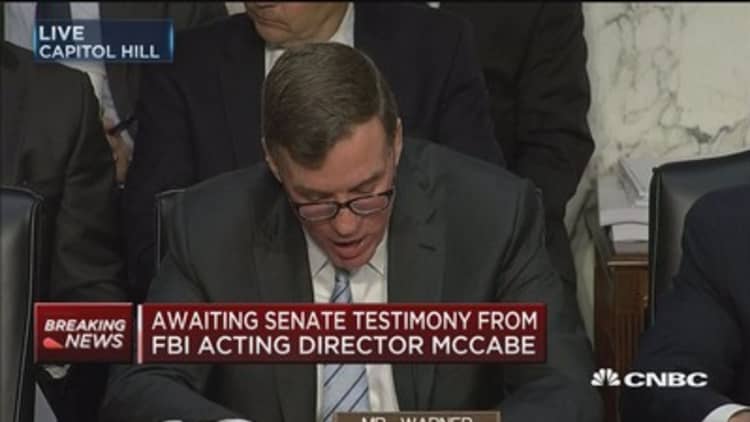
A key senator said Thursday that President Donald Trump's firing of FBI Director James Comey seems "related" to the bureau's investigation into Russian meddling in the 2016 election.
"For many people, including myself, it's hard to avoid the conclusion that the president's decision to remove Director Comey was related" to the Russia probe, Senate Intelligence Committee Vice Chairman Mark Warner, D-Va., said.
He spoke at the panel's scheduled hearing on global threats, which featured FBI Acting Director Andrew McCabe — filling in for Comey — and top U.S. intelligence officials. Committee chairman Richard Burr, R-N.C., stressed that while alleged Russian interference is a "significant threat," the hearing would cover issues beyond Moscow, including North Korea and the Middle East.
"No effort" to disrupt FBI probe
Democrats appeared set to hit the Russia issue early and often. Warner asked McCabe if he would commit to informing the committee of any political interference in the Russia investigation, and McCabe responded, "I absolutely do."
"There has been no effort to impede our investigation to date ... you cannot stop the men and women of the FBI from doing the right thing," McCabe said when Sen. Marco Rubio, R-Fla., asked if the firing has disrupted any of the FBI's work.
The White House has repeatedly said Comey's abrupt firing on Tuesday had nothing to do with the Russia probe, which Comey said in March includes investigating any possible links between Trump campaign associates and Moscow.
The Trump administration has suggested multiple motives for Comey's termination, including his conduct in the probe into Hillary Clinton's handling of classified information last year and an error in his congressional testimony on the probe last week. However, the timing of the firing — which comes as the bureau is investigating the president's campaign — has raised concerns from lawmakers on both sides of the aisle, including several Senate Republicans.
Chairman Burr told reporters Wednesday that the timing and reasoning "incites people to believe that there's something that's being covered up." However, he said he does not personally believe Trump wants to cover anything up with the firing.
McCabe also denied that Comey had lost support of the rank-and-file FBI agents. The White House suggested Wednesday that a loss of confidence in Comey among FBI employees contributed to his firing.
"Director Comey enjoyed broad support within the FBI and still does today," McCabe said.
He called it a "highly significant investigation." The White House has contended that there is nothing underpinning the probe and Americans should move on from it.
McCabe said he was not aware of a reported Comey request for more resources for the probe, adding that he believes it is "adequately" funded.
Democrats have decried the firing and increased their calls for a special prosecutor in the Russia investigation. Most Republican lawmakers, though, have resisted those calls and said that the Senate Intelligence Committee's probe into Russian interference is adequate.
In his letter firing Comey, Trump went out of his way to write that the FBI director told him three times he was not under investigation. Such a statement from Comey would not appear to follow the FBI's protocol, multiple reports said.
Asked Thursday if he knew if Comey told Trump he was not under investigation, McCabe said he could not comment. Later in the hearing, McCabe said he would not give the White House such updates on the investigation.
Trump has repeatedly denied that his campaign colluded with Russia, and has even suggested that Moscow may not be responsible for cyberattacks on Democrats. Russian President Vladimir Putin has said Russia did not meddle in the 2016 election, though Moscow is widely suspected to have interfered in other Western elections.
McCabe, who joined the FBI 20 years ago and became deputy director last year, is respected within the bureau. Comey enjoyed a similar popularity among the rank-and-file of the FBI.
Speaking to CNBC's "Squawk Box" earlier Thursday, Council on Foreign Relations President Richard Haass said "there's something odd" about "this protection of this U.S.-Russia relationship from the get-go."
This is breaking news. Please check back for updates.


